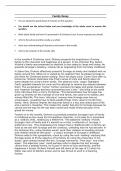Tentamen (uitwerkingen)
GRADE 9 Essay on Family in A Christmas Carol GCSE
- Vak
- Instelling
This essay explores the theme of Family, with context and critical analysis of quotes linked to the theme throughout the novella. This essay was marked as a Grade 9 and written for the Eduqas exam board, but can be adapted for any! Introduction: In the novella A Christmas carol, Dickens presents ...
[Meer zien]




